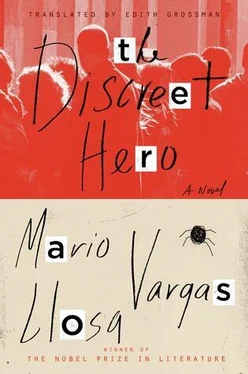“Mabel,” the trucker said, choking. Lituma saw that the little man’s eyes were wet and fat tears were running down his cheeks.
“Sit here, Don Felícito.” The sergeant offered him his chair and helped him into it.
The trucker sat and covered his face with his hands. He wept slowly, silently. His weak body was shaken by sudden tremors. Lituma felt sorry for him. Poor man, now those sons of bitches had found the way to soften him up. It wasn’t right, what an injustice.
“I can assure you of one thing, sir.” The captain also seemed to be moved by what was happening to Felícito Yanaqué. “They’re not going to touch a hair on your friend’s head. They want to frighten you, that’s all. They know it’s not a good idea for them to harm Mabel in any way, that the person in their hands is untouchable.”
“Poor girl,” Felícito Yanaqué stammered, between hiccups. “It’s my fault, I got her into this. What’s going to happen to her? My God, I’ll never forgive myself.”
Lituma saw Captain Silva’s plump face, with its shadow of a beard, moving from pity to anger and back to compassion. He watched him stretch out his arm, pat Don Felícito’s shoulder, and, bringing his head forward, say firmly, “I swear to you by the thing I hold most holy, which is the memory of my mother, that nothing’s going to happen to Mabel. She’ll be returned to you safe and sound. By my blessed mother, I’m going to solve this case and those sons of bitches are going to pay dearly. I never make vows like this, Don Felícito. You’re a man with serious balls, everybody in Piura says so. Don’t go soft on us now, for the sake of all you hold dear.”
Lituma was impressed. What the chief said was true: He never made vows like the one he’d just made. He felt his spirits rising: He’d do it, they’d do it. They’d catch them. Those shits would be sorry they’d done anything so low to this poor man.
“I won’t weaken now or ever,” the trucker stammered, wiping his eyes.
Miki and Escobita arrived right on time, at exactly eleven in the morning. Lucrecia opened the door for them herself, and they kissed her on the cheek. Then, when they were sitting in the living room, Justiniana came in to ask what they would like to drink. Miki asked for an espresso cut with milk and Escobita a glass of sparkling mineral water. It was a gray morning, and low clouds passed over the dark green, foam-flecked ocean in Lima bay. Out at sea some small fishing boats were visible. Ismael Carrera’s sons wore dark suits, ties, handkerchiefs in their breast pockets, and glittering Rolex watches on their wrists. When they saw Rigoberto come in they rose to their feet: “Hello, uncle.” “Damn stupid custom,” thought the master of the house. He didn’t know why, but he was exasperated by the fashion, widespread for some years among Lima’s younger generation, of calling family acquaintances and older people “uncle” or “aunt,” inventing a kinship that didn’t exist. Miki and Escobita shook his hand and smiled, displaying cordiality too effusive to be true. “How well you’re looking, Uncle Rigoberto,” “Retirement agrees with you, uncle,” “You look I don’t know how many years younger than the last time we saw you.”
“You have a nice view from here,” Miki finally said, indicating the seawall and the Barranco ocean. “When it’s clear you must be able to see all the way from La Punta to Chorrillos, isn’t that right, uncle?”
“And I also see and am seen by all the hang gliders and paragliders who brush against the windows as they go by,” Rigoberto agreed. “Any day now a gust of wind will blow one of those intrepid fliers right inside our house.”
His “nephews” greeted the joke with exaggerated laughter. “They’re more nervous than I am,” Rigoberto told himself in surprise.
They were twins but looked nothing alike except for their height, athletic bodies, and bad habits. Did they spend hours in the gym of the Club de Villa or the Regatas Club, exercising and lifting weights? How to reconcile those muscles with their irregular lives, the alcohol, the cocaine, the wild parties? Miki had a round, self-satisfied face, a thick-lipped mouth full of carnivorous teeth, and a pair of pendulous ears. He was very white, almost a gringo with his light hair, and from time to time he would smile in a mechanical way, like a ventriloquist’s dummy. Escobita, on the other hand, was very dark-skinned and had dark piercing eyes, a lipless mouth, and a thin, penetrating voice. He wore the long sideburns of a flamenco singer or a bullfighter. “Which one is stupider?” Rigoberto thought. “And which one more depraved?”
“Don’t you miss the office now that all your time is free, uncle?” asked Miki.
“The truth is I don’t, nephew. I read a great deal, listen to good music, lose myself for hours in my art books. I’ve always liked painting more than insurance, as Ismael must have told you. Now I can finally devote a great deal of my time to it.”
“What a library you have here, uncle,” Escobita exclaimed, indicating the orderly shelves in the adjacent study. “Damn, that’s a lot of books! Have you read them all?”
“Well, not yet, not all of them.” (“This one’s stupider,” he decided.) “Some are reference books, like the dictionaries and encyclopedias in this corner. But my theory is that there’s more chance of reading a book if you have it at home than if it’s in a bookstore.”
The two brothers, disconcerted, kept looking at him, no doubt wondering whether he’d made a joke or was serious.
“With so many art books it’s like you’ve brought to your study here all the museums in the world,” declared Miki, putting on the face of an astute and learned man. “And this way you can visit them without bothering to leave your house. That’s really convenient.”
“When you’re as imbecilic as this biped, you become intelligent,” Rigoberto thought. It was impossible to know which he was: six of one, half a dozen of the other. A heavy, interminable silence had settled over the living room, and to hide the tension, the three of them looked toward the study. “The time has come,” Rigoberto thought. He experienced a slight feeling of alarm but was curious to know what would happen. He felt absurdly protected because he was on his own territory, surrounded by his books and etchings.
“Well, uncle,” Miki said, blinking very quickly, his finger in the air moving toward his mouth, “I think the moment has come for us to take the bull by the horns and move on to some sad topics.”
With a gargling sound, Escobita continued to drink the mineral water in his half-empty glass. He scratched his forehead ceaselessly and his eyes darted from his brother to Rigoberto.
“Sad? Why sad, Miki?” Rigoberto assumed a surprised expression. “What’s wrong, boys? Are we having some more little problems?”
“You know very well what’s wrong, uncle,” Escobita exclaimed, an offended tone in his voice. “Don’t act dumb, please.”
“Are you referring to Ismael?” Rigoberto played the fool. “Do you want to talk about him? About your father?”
“We’re the laughingstock of Lima, the talk of the whole city.” Miki assumed a melodramatic expression, zealously biting his little finger. He spoke without taking his finger out of his mouth and his voice sounded affected. “You must have known, because even the stones knew. No one talks about anything else in this city, maybe in all of Peru. I never imagined the family would be involved in a scandal like this.”
“A scandal you could have avoided, Uncle Rigoberto,” Escobita declared, almost pouting. Only now did he seem to notice that his glass was empty. He placed it on the table in the center of the room with exaggerated care.
Читать дальше

![Гарри Гаррисон - Bill, the Galactic Hero [= The Starsloggers]](/books/87536/garri-garrison-bill-the-galactic-hero-the-star-thumb.webp)










